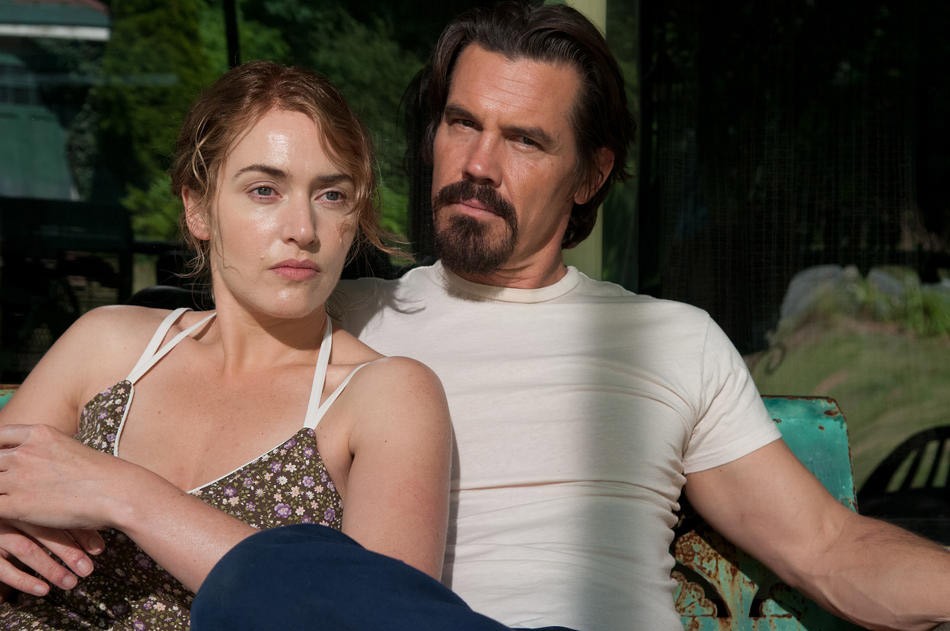A love story about a brief and passionate romance between an escaped convict and a divorced single mother suffering a prolonged nervous breakdown hardly seems guaranteed box-office boffo, even for the weepie crowd. For reasons of his own, Jason Reitman, who previously directed some offbeat films like "Thank You for Smoking" and "Up in the Air," chose a rather obscure novel by Joyce Maynard for his latest effort, the odd, improbable "Labor Day."

- PHOTO COURTESY PARAMOUNT PICTURES
- Kate Winslet and Josh Brolin in “Labor Day.”
Narrated by 11-year-old Henry (Gattlin Griffin), the film takes place in a small New England town over the long Labor Day weekend of 1987. Henry provides some history, recounting his parents' divorce and describing his mother Adele's (Kate Winslet) fragile state -- she rarely leaves her home, has trouble concentrating, neglects most of the basic housekeeping, and depends upon Henry for necessary errands.
Their confined, unhappy life changes drastically when an injured man, Frank (Josh Brolin), confronts Henry in the supermarket and asks him for a ride; when Henry leads him to Adele, Frank implies a threat to Henry so that Adele will take him to their house. The television news informs Adele and Henry that Frank is an escaped convict who was serving time for murder, a charge Frank denies. Frank promises that he will not harm them, but only needs a place to hide for a few hours.
The simple story unfolds from that point in several different directions. Frank ties the two up, so they can tell the police that they acted under duress; he then cooks dinner for everyone, decides he must stay a few more days, and settles into the household. He cleans the place, repairs some of the damage from neglect, shows Henry how to play ball, and demonstrates a quality of gentleness that naturally wins over Adele.
Quite soon the situation turns into something like the Stockholm Syndrome, only with sex. As Henry realizes the extent of his mother's relationship with Frank, the action also becomes a kind of coming of age for the young boy. The vague Oedipal suggestions in Henry's life with his mother dissipate with his increasing appreciation for Frank's kindness and attention.
To tell the necessary back stories -- the reasons for Adele's breakdown and Frank's incarceration -- the movie shifts somewhat confusingly to sequences from their past lives. Adele explains her personal history and a series of initially puzzling flashbacks reveal the circumstances of Frank's crime. When those two narrative threads connect, the picture generates suspense, finally moving toward some hasty and implausible melodrama.
The generally quiet and understated performances help to create an atmosphere of authenticity for a story that challenges credibility. Josh Brolin, whose last role as another incarcerated protagonist in the very strange "Old Boy," demonstrated at least the ability to sustain singlehandedly an unlikely situation, in "Labor Day" maintains a low-key presence throughout, suggesting a quality of gentleness absent in his previous pictures.
In a rather different part for her, Kate Winslet generally matches Brolin in restraint; unkempt, decidedly unglamorous, distracted, shaky, she provides a most convincing portrait of a woman at the end of her rope. Young Gattlin Griffin as Henry displays a tiresome deadpan and a most passive acting style. In a movie that proceeds through silences, he remains practically mute throughout.
Perhaps the most credible element in this offbeat and drawn-out love story, significantly assisting in the establishment of a sense of real life in a real environment, the small-town setting works most effectively. The houses, including the neighborhood where Adele and Henry live, the streets, the landscape in general demonstrate the usefulness of location shooting.
The cast of unknown actors playing the citizens all look and behave very like the people of their time and place. When Henry shops for his mother or cashes her check at the bank, the owner of the grocery store and the teller in the bank inquire about Adele's health in just the way people in small towns appear to know everybody's business, and at best, seem to care about the people they know. Some of the best parts of a not terribly successful film simply show the appearance and the atmosphere of a little New England town, no mean quality in a Hollywood film.